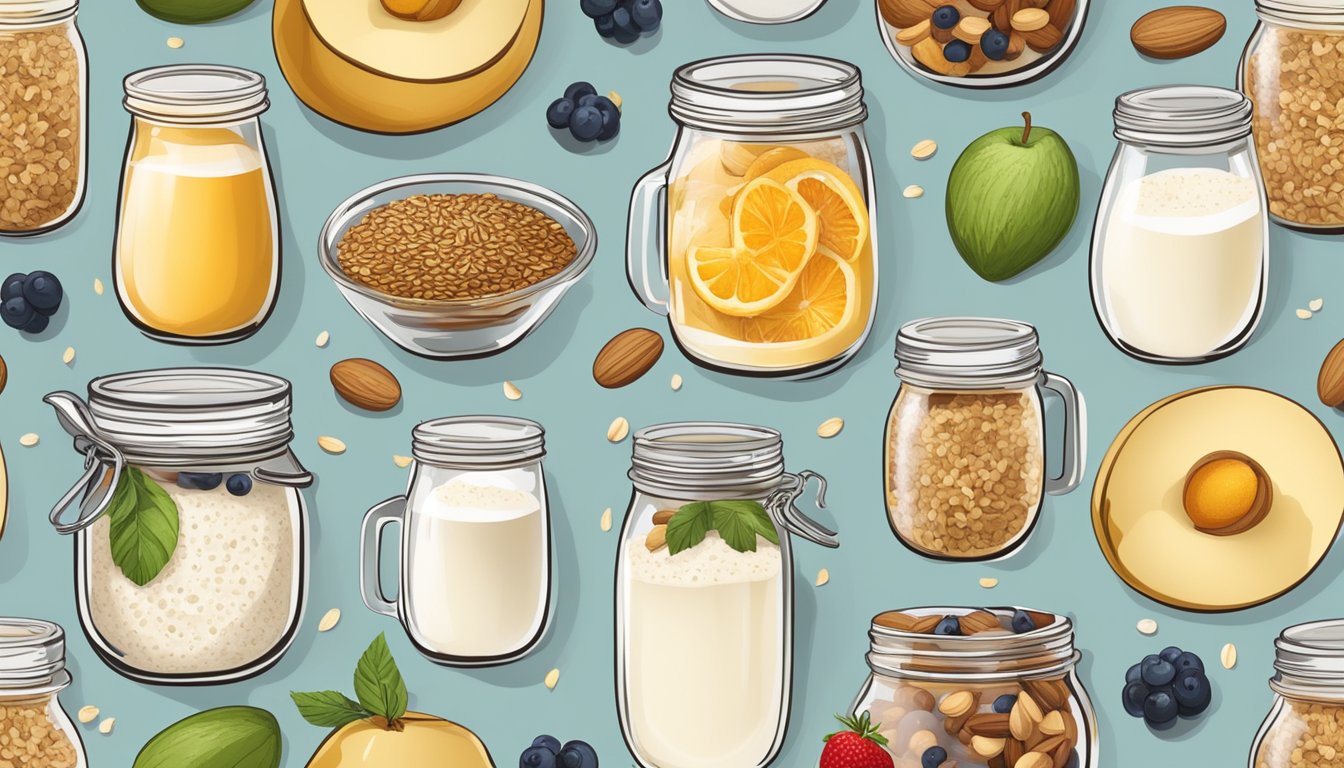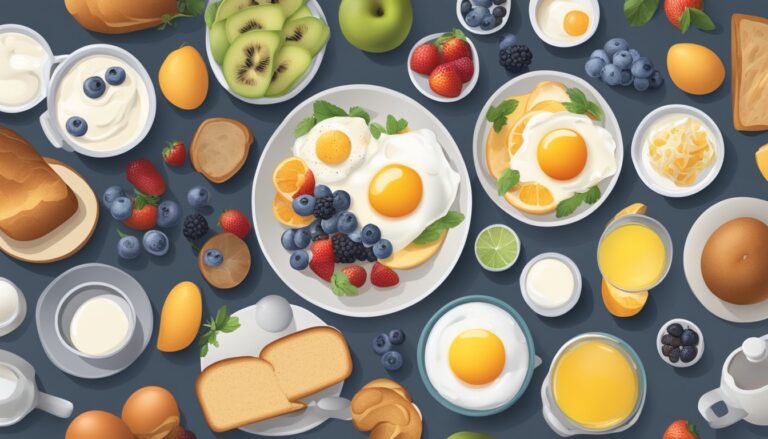Overnight oats have revolutionized breakfast routines for busy individuals seeking a nutritious and convenient start to their day. This no-cook method transforms simple ingredients into a delicious and customizable meal that can be prepared in advance. Overnight oats combine rolled oats, milk, yogurt, and optional add-ins like fruits, nuts, and sweeteners, which are left to soak in the refrigerator for at least 4 hours or overnight.
The beauty of overnight oats lies in their versatility and ease of preparation. By following a basic formula, anyone can create a personalized breakfast that aligns with their taste preferences and dietary needs. This make-ahead approach to breakfast not only saves time in the morning but also ensures a wholesome meal is ready to fuel the day ahead.
Exploring the Basics of Overnight Oats
Overnight oats offer a convenient and nutritious breakfast option. This simple preparation method yields a creamy, chilled oatmeal that can be customized to suit various tastes and dietary needs.
What Are Overnight Oats?
Overnight oats are a no-cook method of preparing oatmeal. The process involves soaking raw oats in liquid, typically milk or a non-dairy alternative, for several hours or overnight in the refrigerator. This soaking softens the oats, making them easily digestible and ready to eat cold.
The basic recipe calls for equal parts oats and liquid. Many people add yogurt, chia seeds, or fruit for extra flavor and nutrition. Unlike traditional hot oatmeal, overnight oats require no cooking or heating.
Benefits of Overnight Oats
Overnight oats offer numerous health benefits. They are rich in fiber, which aids digestion and promotes feelings of fullness. The slow-release carbohydrates provide sustained energy throughout the morning.
The cold soaking process preserves more nutrients compared to cooking. This method also enhances the bioavailability of certain minerals in oats. Overnight oats are highly customizable, allowing for the addition of various nutritious ingredients like fruits, nuts, and seeds.
For busy individuals, overnight oats save time in the morning. They can be prepared in batches, making breakfast planning easier for the week ahead.
Oats Varieties and Their Textures
Different types of oats yield varying textures in overnight oats. Rolled oats are the most commonly used and provide a creamy, soft texture. They absorb liquid well and maintain a pleasant chewiness.
Steel-cut oats produce a chewier, more textured result. They require longer soaking time and more liquid due to their minimal processing. Quick oats, while usable, tend to become mushy and may not offer the ideal texture for overnight oats.
Instant oats are not recommended for this method as they break down too quickly, resulting in a paste-like consistency.
The Role of Liquid in Overnight Oats
The liquid component is crucial in overnight oats. It softens the oats and creates the desired creamy texture. Milk is a popular choice, providing protein and calcium. Non-dairy alternatives like almond milk or coconut milk offer lactose-free options.
The ratio of liquid to oats is typically 1:1, but can be adjusted for desired consistency. Too little liquid results in dry, hard oats, while too much creates a soupy mixture. Some recipes include yogurt for added creaminess and protein.
The type of liquid used affects the final flavor and nutritional profile of the overnight oats. Experimenting with different liquids can create varied taste experiences.
Ingredients and Add-Ins
Customizing overnight oats allows for endless flavor combinations and nutritional boosts. The right ingredients transform basic oats into a delicious and satisfying meal.
Choosing Your Dairy or Plant-Based Milk
Milk forms the liquid base for overnight oats. Dairy milk provides protein and calcium. For a plant-based option, almond, oat, or soy milk work well. Coconut milk adds richness and tropical flavor. Greek yogurt increases protein content and creates a thicker consistency.
Experiment with different milk-to-oat ratios to find your ideal texture. Start with a 1:1 ratio and adjust as needed. Add more liquid for a looser consistency or less for thicker oats.
Selecting Your Sweeteners Wisely
Natural sweeteners enhance flavor without excessive sugar. Honey and maple syrup are popular choices. They dissolve easily and complement oats well. Date syrup offers a caramel-like taste. Mashed banana provides natural sweetness and creaminess.
Use sweeteners sparingly. Start with 1-2 teaspoons per serving and adjust to taste. Ripe fruits can reduce the need for added sweeteners.
Nuts and Seeds for Texture and Nutrition
Nuts and seeds add crunch and nutritional benefits. Almonds, walnuts, and pecans provide healthy fats and protein. Chia seeds absorb liquid and create a pudding-like texture. They’re rich in omega-3 fatty acids and fiber.
Hemp seeds offer a nutty flavor and complete protein. Pumpkin seeds add zinc and magnesium. Nut butters like peanut or almond butter create a creamy texture and boost protein content.
Mix in 1-2 tablespoons of nuts or seeds per serving. Add them before refrigerating or just before eating to maintain crunch.
Fruits and Berries for Natural Sweetness
Fresh or frozen fruits add natural sweetness and vitamins. Berries like blueberries, strawberries, and raspberries are rich in antioxidants. They pair well with vanilla or almond flavors.
Sliced bananas contribute potassium and natural sweetness. Diced apples with cinnamon create a classic flavor combination. Peaches or mangoes add a tropical twist.
Add fruits before refrigerating for a softer texture. For firmer fruit, mix in just before serving. Use about 1/4 to 1/2 cup of fruit per serving.
Spices and Flavors for Variety
Spices and extracts transform basic oats into gourmet creations. Cinnamon adds warmth and may help regulate blood sugar. Nutmeg pairs well with banana or pumpkin flavors. Cardamom offers a unique, aromatic twist.
Vanilla extract enhances sweetness without adding sugar. Almond extract complements fruit flavors. Cocoa powder creates a chocolate version rich in antioxidants.
Start with 1/4 teaspoon of spices or extracts per serving. Adjust to taste. Mix spices with dry ingredients before adding liquid for even distribution.
Nutritional Considerations

Overnight oats offer a balanced combination of macronutrients and essential vitamins and minerals. The nutritional profile can be tailored to individual needs through ingredient choices and additions.
Protein and Overnight Oats
Oats naturally contain protein, but the amount can be boosted for a more satisfying meal. Adding Greek yogurt increases protein content significantly. For plant-based options, soy milk or pea protein powder work well.
Nuts and seeds like almonds, chia, or hemp seeds provide additional protein along with healthy fats. A tablespoon of nut butter stirred in before eating adds flavor and protein.
Protein content can range from 10-20 grams per serving, depending on ingredients used. This helps with muscle maintenance and promotes satiety.
Understanding Carbohydrates and Fiber
Oats are rich in complex carbohydrates, providing sustained energy throughout the morning. They contain beta-glucan, a soluble fiber that aids in digestive health and may help lower cholesterol.
The fiber content in oats:
- Slows digestion
- Promotes feelings of fullness
- Helps regulate blood sugar levels
A typical serving of overnight oats contains 25-40 grams of carbohydrates and 4-8 grams of fiber. Adding fruits can increase both carb and fiber content.
Chia seeds and flaxseeds boost fiber further, supporting gut health and regular bowel movements.
The Importance of Healthy Fats
Incorporating healthy fats into overnight oats enhances nutrition and flavor. Omega-3 fatty acids from chia seeds or ground flaxseed support heart and brain health.
Nuts and nut butters provide monounsaturated fats, which are beneficial for heart health. Coconut flakes or coconut milk add medium-chain triglycerides (MCTs).
Healthy fats:
- Aid in nutrient absorption
- Contribute to satiety
- Support hormone production
A balanced serving of overnight oats typically contains 5-15 grams of healthy fats, depending on additions.
Balancing Macronutrients
Creating a well-balanced bowl of overnight oats involves considering the ratio of carbohydrates, proteins, and fats. Aim for a mix that aligns with individual nutritional goals and dietary preferences.
A balanced macronutrient profile might look like:
- 50-60% carbohydrates
- 20-30% protein
- 20-30% fats
This balance supports stable energy levels, muscle recovery, and overall satiety. Adjustments can be made based on specific health goals or dietary restrictions.
Adding protein powder or extra nuts can shift the balance towards higher protein content. Using low-fat milk or yogurt reduces overall fat content if desired.
Preparation Tips and Techniques

Mastering overnight oats requires attention to detail and a few key techniques. These tips will help you create the perfect batch every time.
Soaking Oats: Maximizing Benefits
Soaking oats overnight enhances their nutritional value and digestibility. Use a 1:1 ratio of rolled oats to liquid for ideal consistency. Cold milk or plant-based alternatives work well.
Add a tablespoon of chia seeds or ground flaxseed to boost omega-3 fatty acids and fiber content. These ingredients also help thicken the mixture.
For a tropical paradise twist, use coconut milk as your liquid base. It adds richness and complements fruits like mango and pineapple beautifully.
Layering Ingredients for Taste and Texture
Create visually appealing and flavorful oats by layering ingredients strategically. Start with oats and liquid at the bottom of your container.
Add a middle layer of yogurt for creaminess and protein. Top with fresh or dried fruits, nuts, and seeds for crunch and natural sweetness.
For a seasonal touch, sprinkle pumpkin spice on top. This blend of cinnamon, ginger, nutmeg, and allspice adds warmth and depth to your oats.
Achieving the Perfect Consistency
The key to perfect overnight oats lies in the oat-to-liquid ratio. Start with equal parts and adjust based on personal preference.
For thicker oats, reduce liquid slightly or add more chia seeds. If you prefer a looser consistency, increase the liquid amount.
Stir the mixture well before refrigerating to ensure even distribution of flavors and proper hydration of the oats.
Check the texture in the morning. If too thick, add a splash of milk. If too thin, mix in some additional oats or chia seeds and let sit for 10-15 minutes.
Overnight Oats Recipes for Inspiration
Overnight oats offer endless possibilities for delicious and nutritious breakfasts. From classic combinations to innovative flavors, there’s an overnight oats recipe for every taste preference and season.
Classic Overnight Oats Recipes
The foundation of a great overnight oats recipe starts with simple, tried-and-true combinations. Apple cinnamon overnight oats blend diced apples, cinnamon, and a touch of honey for a comforting morning treat.
For chocolate lovers, chocolate peanut butter overnight oats satisfy sweet cravings while providing protein. Mix cocoa powder, peanut butter, and a dash of maple syrup into your oats for a decadent yet healthy breakfast.
Another popular option is vanilla berry overnight oats. Combine vanilla extract, mixed berries, and a sprinkle of chia seeds for added nutrition and texture.
Innovative Flavor Combinations
Creative overnight oats recipes push the boundaries of traditional breakfast flavors. Carrot cake overnight oats incorporate grated carrots, raisins, and warm spices for a dessert-inspired morning meal.
For a tropical twist, try coconut mango overnight oats. Mix in shredded coconut, diced mango, and a splash of coconut milk for a taste of the tropics.
Coffee lovers can enjoy mocha overnight oats by adding brewed coffee, cocoa powder, and a dash of espresso powder to their oats mixture.
Seasonal Variations and Themes
Adapting overnight oats recipes to the seasons ensures variety throughout the year. Pumpkin pie overnight oats capture the essence of fall with pumpkin puree, pumpkin pie spice, and pecans.
For summer, lemon blueberry overnight oats offer a refreshing combination of zesty lemon and sweet blueberries. In winter, gingerbread overnight oats with molasses and warming spices provide comfort on cold mornings.
Holiday-themed overnight oats, like red velvet for Valentine’s Day or green matcha for St. Patrick’s Day, add fun to breakfast routines.
Customization and Personalization

Overnight oats offer endless possibilities for tailoring to individual tastes and dietary needs. The versatility of this dish allows for creative experimentation with ingredients and flavors.
Creating Your Own Overnight Oats Recipe
Start with a base of rolled oats and liquid. Choose from dairy milk, plant-based alternatives like almond or oat milk, or even coffee for a morning boost. Add chia seeds or flax for extra nutrition and texture.
Sweeteners can be adjusted to taste. Options include honey, maple syrup, or stevia for a low-calorie choice. Fresh or frozen fruits add natural sweetness and flavor variety.
For protein, mix in Greek yogurt, protein powder, or nut butters. Spices like cinnamon, nutmeg, or vanilla extract enhance the taste profile.
Toppings added before eating provide crunch and extra nutrients. Try nuts, seeds, granola, or coconut flakes.
Adapting to Dietary Restrictions
Overnight oats easily accommodate various dietary needs. For gluten-free diets, use certified gluten-free oats to ensure safety.
Vegan versions substitute dairy products with plant-based milk and yogurt alternatives. Nut milks, coconut yogurt, or silken tofu work well.
For low-sugar diets, skip added sweeteners and rely on fruits or sugar-free flavoring. Berries or grated apple provide natural sweetness.
High-protein variations incorporate Greek yogurt, protein powder, or collagen peptides. These additions support muscle recovery and satiety.
Nut-free recipes replace nut milks with oat or rice milk and avoid nut-based toppings. Seeds offer similar nutritional benefits to nuts.
Storing and Serving Recommendations

Proper storage and creative serving techniques are key to enjoying delicious overnight oats. These practices ensure optimal freshness and allow for customization to suit individual tastes.
Best Practices for Storing Overnight Oats
Store prepared overnight oats in airtight containers in the refrigerator for up to 5 days. Glass jars or plastic containers work well for individual portions.
For meal prep convenience, make a large batch and divide it into separate containers. This allows for quick grab-and-go breakfasts throughout the week.
Label containers with preparation dates to track freshness. Consume within 3-5 days for best quality and taste.
If freezing, use freezer-safe containers and leave some space for expansion. Frozen overnight oats can last up to 6 months. Thaw in the refrigerator overnight before consuming.
Serving Suggestions and Garnishes
Serve overnight oats cold straight from the refrigerator or gently warm them if preferred. Add a splash of milk if the oats have thickened too much.
Top with fresh fruit like berries, sliced bananas, or diced apples for added nutrients and natural sweetness. This adds a delightful contrast to the creamy oats.
Sprinkle granola, shredded coconut, or cacao nibs for a crunchy texture. These toppings provide a satisfying contrast to the soft oats.
Add a drizzle of honey, maple syrup, or nut butter for extra flavor. This can enhance the overall taste profile of the oats.
Experiment with dried fruits like raisins, cranberries, or goji berries for a chewy texture and concentrated sweetness.
Integrating Overnight Oats into Your Routine

Overnight oats offer a convenient and nutritious breakfast option that can revolutionize your morning routine. This simple preparation method aligns well with various health goals and dietary preferences.
How Overnight Oats Can Transform Your Morning
Preparing overnight oats the evening before frees up valuable time in the morning. This allows for a more relaxed start to the day, reducing stress and potentially lowering cortisol levels. The ready-to-eat nature of overnight oats eliminates the need for cooking, making it an ideal choice for busy professionals or parents.
Overnight oats provide sustained energy throughout the morning due to their high fiber content. This leads to improved satiety, helping to curb mid-morning snacking and maintain stable blood sugar levels.
The versatility of overnight oats accommodates various dietary restrictions and preferences. They can be easily customized with different milk alternatives, fruits, nuts, and seeds to suit individual tastes and nutritional needs.
Aligning Overnight Oats with Your Health Goals
Overnight oats support weight management efforts by promoting feelings of fullness. The combination of complex carbohydrates and fiber aids in regulating appetite and reducing overall calorie intake throughout the day.
For those focused on gut health, overnight oats can be a beneficial addition to the diet. The fermentation process that occurs during soaking can enhance the bioavailability of nutrients and support healthy digestion.
Athletes and fitness enthusiasts can benefit from the balanced macronutrient profile of overnight oats. The mixture of carbohydrates and proteins provides energy for workouts and supports muscle recovery.
Overnight oats can be tailored to specific health conditions. For example, adding chia seeds can boost omega-3 intake, while using low-fat milk can reduce saturated fat content for heart health.




